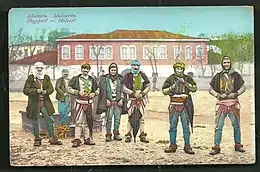Bushati family
The Bushati family (Albanian: Bushatllinjtë) was a prominent Ottoman Albanian family that ruled the Pashalik of Scutari from 1757 to 1831.
| Part of a series on |
| Albanian tribes |
|---|
 |
Origins
They are descendants of the medieval Bushati tribe, a pastoralist semi-nomadic tribe (fis) in northern Albania and Montenegro. The name Bushat is compound of mbë fshat (above the village).[1] This is a reference to them being pastoralists that weren't permanently settled. The Bushati started to settle permanently in the 15th century and this process had been completed in the late 16th century. Their settlement includes the village of Bushat in Shkodër in the Zadrima plain from where the Bushati family came. Another part settled with the tribe of Bukumiri in the would-be territory of the Piperi tribe, where they gradually became part of the new, larger tribe in the late 16th century. In the defter of 1497 they appear as katun Bushat in Piperi with 35 households.[2]
The Bushati family traces their origin to the Begaj brotherhood of Bushati that had converted to Islam possibly in the early 17th century. To promote their status and political goals statesmen, commanders and leaders from that family put forward different theories about their origins. Evliya Çelebi in his time recorded a story about them being descendants of a Jusuf Bey Plaku, who traced his origin and status to the era of Mehmed the Conqueror. In the period of the Pashalik of Shkodra, Kara Mahmud Bushati sought to expand northwards in the old lands of Ivan Crnojević of the Middle Ages. In order to legitimize and strengthen his claim, he put forward another theory that he descended from Skenderbeg Crnojević, Ivan's Muslim son.[3][4]
A century later, when the Albanian national movement was on the rise, yet another theory came forward. According to that theory, which Sami Frashëri recorded, the Bushati were descendants of the old feudal Dukagjini family.[5]
History
Their dominance of the Scutari region was gained through a network of alliances with various highland tribes. Even after the fall of the pashaluk in 1831, the Bushatis continued to play an important role in the Albanian society. During the 19th century, Shkodër was also known as a cultural centre and in the 1840s the Bushati Library was built.
Genealogical tree of the House of Bushati
│Mehmed Paşa
├─> Derviş Bey
└─> Ömer Bey
│
└─> Süleyman Paşa (Vali of Rumelia, 1115 AH)
│
├─> Halil Paşa
├─> Ali Bey
├─> Hasan Paşa
├─> Arslan Paşa
├─> Deli Hüseyin Paşa
└─> Kapudan Mehmed Bey
│
├─> Abdullah Paşa
└─> Mustafa Bey
│
├─> Haci Süleyman Paşa
└─> Mehmed Paşa Plaku (the Old)
│
├─> İbrahim Paşa
├─> Ahmed Paşa
├─> Karamahmud Paşa
└─> Mustafa Paşa Qorri (the Blind)
│
└─> Mehmed Paşa (died in Tirana, in 1217 AH)
│
└─> Şerif Mustafa Paşa
│
├─> Mahmud Paşa
├─> İsuf Bey
├─> Hasan Paşa
└─> Riza Bey
│
└─> Celal Paşa
List of prominent family members
- Süleyman Bushati, sanjak-bey of Scutari, noted for his wars against Montenegrins.
- Kara Mahmud Bushati, chief of Albanian tribe based in Shkodër, named governor of Shkodër by the Ottoman authorities.
- Ibrahim Bushati
- Mustafa Pasha Bushati
- Xhelal Pasha, Ottoman official and related to sultan Abdul Hamid II through marriage[6]
- Petrit Bushati, Senior Albanian Diplomat, Has served as Ambassador of Albania to Sweden, USA, Serbia & Montenegro
- Maliq Bushati, Prime Minister
- Sali Bushati, former member of the Assembly of Albania
- Astrit Bushati, member of the Assembly of Albania
- Ahmet Bushati, Chairman of Municipality Council of Shkoder 1992-1996
- Xhemal Bushati, politician, former member of the Assembly of Albania, anti-Zogist activist
- Ditmir Bushati, politician and the former Minister of Foreign Affairs
See also
For the village in Kosovo also sometimes called Bushati, see Komorane.
Sources
- Jazexhiu, Olsi (2002). The Albanian Pashalik of Shkodra under Bushatlis 1757 – 1831. Kuala Lumpur: IIUM. Archived from the original on 2015-06-27. Retrieved 2015-06-26.
- Blumi, Isa (2011). Reinstating the Ottomans: Alternative Balkan Modernities, 1800-1912. Palgrave Macmillan. ISBN 978-0-230-11908-6.CS1 maint: ref=harv (link)
- Pllumi, Zef. Frati i Pashallarëve Bushatli të Shkodrës:(Át Erasmo Balneo):(1756-1788); kronikë e gojdhanë. Botime Françeskane, 2004.
- Stavri, N. Pashalleku i Shkodrës nën sundimin e Bushatllive në gjysmën e dytë të shekullit të XVIII, 1757-1796.(La Pachalik de Shkodër sous les Bushatli à la deuxieme moitié du XVIIIe siècle. Résumé.). 1964.
References
- Landi, Addolorata (2002). Variazioni linguistiche in albanese. Edizioni Scientifiche Italiane. p. 46. ISBN 8881148455. Retrieved 20 February 2020.
- Pulaha, Selami (1975). "Kontribut për studimin e ngulitjes së katuneve dhe krijimin e fiseve në Shqipe ̈rine ̈ e veriut shekujt XV-XVI' [Contribution to the Study of Village Settlements and the Formation of the Tribes of Northern Albania in the 15th century]". Studime Historike. 12: 87-89. Retrieved 30 January 2020.
- Đoko M. Slijepčević (1983). Srpsko-arbanaški odnosi kroz vekove sa posebnim osvrtom na novije vreme. D. Slijepčević.
... упадима и организованим нападима Скадарскога везира Махмуд-паше Бушатлије. У кући Бушатлија чувала се традици- ја о њиховом пореклу од потурченога сина Ивана Црнојевића. «Та традиција о пореклу Бушатлија јачала ...
- Vasilije Crnogorski; Paisij Khilendarski; Armando Pitassio; Sofronij Vrachanski (2003). Balcani nel caos. Edizioni Scientifiche Italiane. p. 22. ISBN 978-88-495-0742-3.
Bushatli, sicché in seguito i vizir albanesi di Bushatli pretesero di discendere dai Crnojevic
- Frashëri, Sami (2002). Shqipëria dhe shqiptarët: Materiali nxjerrë nga "Diksionieri historik e gjeografik". Tiranë: Dajti 2000. p. 244. ISBN 9789992772027.
- Gawrych, George (2006). The Crescent and the Eagle: Ottoman rule, Islam and the Albanians, 1874–1913. London: IB Tauris. p. 85. ISBN 9781845112875.CS1 maint: ref=harv (link)